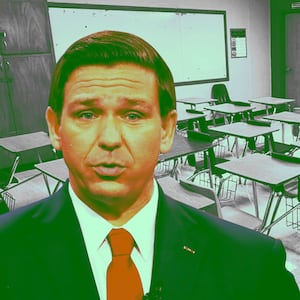Gov. Ron DeSantis is doing nothing to prevent the Miami Dolphins from filling their 65,000-person stadium despite Florida’s continued struggle to contain the coronavirus, which has already killed over 15,000 people in the Sunshine State alone.
In a stunning decision last month, the Republican governor moved Florida into Phase 3 of the state’s reopening plan, dropping all restrictions on businesses and allowing stadiums to operate at full capacity. That means the NFL team can admit 65,000 fans into Hard Rock Stadium in Miami Gardens, regardless of recommendations on social distancing and large group gatherings established by the Centers for Disease Control and Prevention.
“Sports franchises can do as they please, they don’t need clearance from the state,” Cody McCloud, press secretary for the governor’s office, told The Daily Beast.
ADVERTISEMENT
So far, the Dolphins have no plans to open the stadium at full capacity, but will allow 13,000 fans to attend the next home game against the Los Angeles Chargers on Oct. 25, according to Fox Sports reporter Andy Slater. Last month, about 11,075 people attended the NFL team’s home opener against the Buffalo Bills, and 12,369 fans went to their last home game on Sunday against the Seattle Seahawks.
“We’ll continue to follow CDC guidelines & put everyone’s safety first & monitor things as they go,” Tom Garfinkel, the Dolphins’ CEO, said in a statement to ESPN. “Right now with [COVID-19] positivity rates where they are, we feel that we can keep people safe in a socially distanced environment, which is our 13,000 capacity manifest.”
It was not immediately clear if this plan also applies to the University of Miami’s game against the University of Pittsburgh next week at Hard Rock Stadium.
Florida is home to three NFL teams as well as a number of college football teams that have not yet announced if they plan to adhere to public safety guidelines to curtail the spread of the coronavirus.
While the Tampa Bay Buccaneers and Jacksonville Jaguars did not respond to The Daily Beast’s request for comment, both teams have previously announced plans to reduce or limit fans in their stadiums. The Jaguars are currently filling TIAA Bank Field, which holds 67,164 people, to between 20 and 25 percent capacity, while the Buccaneers went fanless for their first two games. The Tampa Bay team, however, is expected to welcome back some fans at Raymond James Stadium, which holds 65,618, for the Oct. 18 game against the Green Bay Packers (which announced Wednesday plans to keep their own stadium empty until further notice).
“Ultimately, public health is our top priority,” Buccaneers COO Brian Ford wrote in a letter to season ticket holders last month.
The CDC has not recommended a specific limit on the number of attendees at sporting events, but says the “emphasis should be placed on the ability to reduce and limit contact between people.”
“The more people someone interacts with, the closer, the longer, and the more frequent the interaction, and the more contact with frequently touched surfaces, the higher the risk of COVID-19 spread. Indoor events pose a greater risk than outdoor events,” the CDC states.
To date, 15,084 people have died and 722,707 have been infected with the coronavirus in the state, a major virus hotspot over the summer. And while the situation has improved since June, when the Sunshine State clocked over 10,000 new cases per day, the Florida Department of Health reported that its positive rate exceeded 5 percent this week.
“While new diagnoses of COVID-19 have been on the decline in South Florida, there is still substantial community spread. Allowing for spectators to fill large stadiums may very well stymie progress the state and its regional localities have made,” Dr. Tali Elfassy, an epidemiologist and Research Assistant Professor of Epidemiology in the Department of Public Health Sciences at the University of Miami Miller School of Medicine, told The Daily Beast.
Eflassy added that many other states have chosen to “forbid spectators” or limit capacity to help prevent virus spread. And while outdoor stadiums are better than indoor activities, the doctor said “packing thousands of people into sports venues has the potential to exacerbate the outbreak.”
“Encounters with people will be unavoidable—even with staggered entry times, limited capacity, and no tailgating. This scenario, even with the restrictions imposed, certainly increases risk of further spread,” she said.
DeSantis—a Navy vet who has likened reopening schools to a SEAL mission—has embraced rolling back Florida’s already lax restrictions and has refused a statewide mask mandate, which even other southern GOP governors, like those in Mississippi and Alabama, eventually enacted as their virus situations spiraled.
On Sept. 25, DeSantis moved the state into Phase 3, allowing bars, restaurants, gyms, shops, stadiums, and theme parks to operate at 100 percent capacity, with only some room for local limitations, according to the state’s plan.
To make matters worse, the governor announced he’d override local efforts to keep some businesses closed.
“We’re probably the most open big state in the country,” DeSantis said in a Sept. 25 press conference, touting record tourism summers for some Panhandle communities. “We’re not closing anything going forward.”
According to the Sun Sentinel, local hospitals have already warned officials they expect a “surge” in COVID-19 cases later in October in direct response to DeSantis’ decision to lift restrictions.
“Whenever there is an increase in community activity due to changes in restrictions, there is a lag time between those restrictions being lifted and the opportunity for the virus to spread further... and then presentation of symptoms in the emergency departments,” Dr. Tim Macaluso, of Memorial Healthcare Systems, said in the Friday conference call with local leaders. “This is the so-called surge we are preparing for.”
The possibility of a second surge in Florida could have consequences on the future of sporting events in the state, including Super Bowl LV, which is slated to be held in Tampa in February 2021. DeSantis said in September he expects the biggest football game of the season will be held in front of fans.
“We’re going to be able to host the Super Bowl in February. We expect to do a full Super Bowl,” DeSantis said in September. “We’re going to show that we’re going to be able to do that.”







